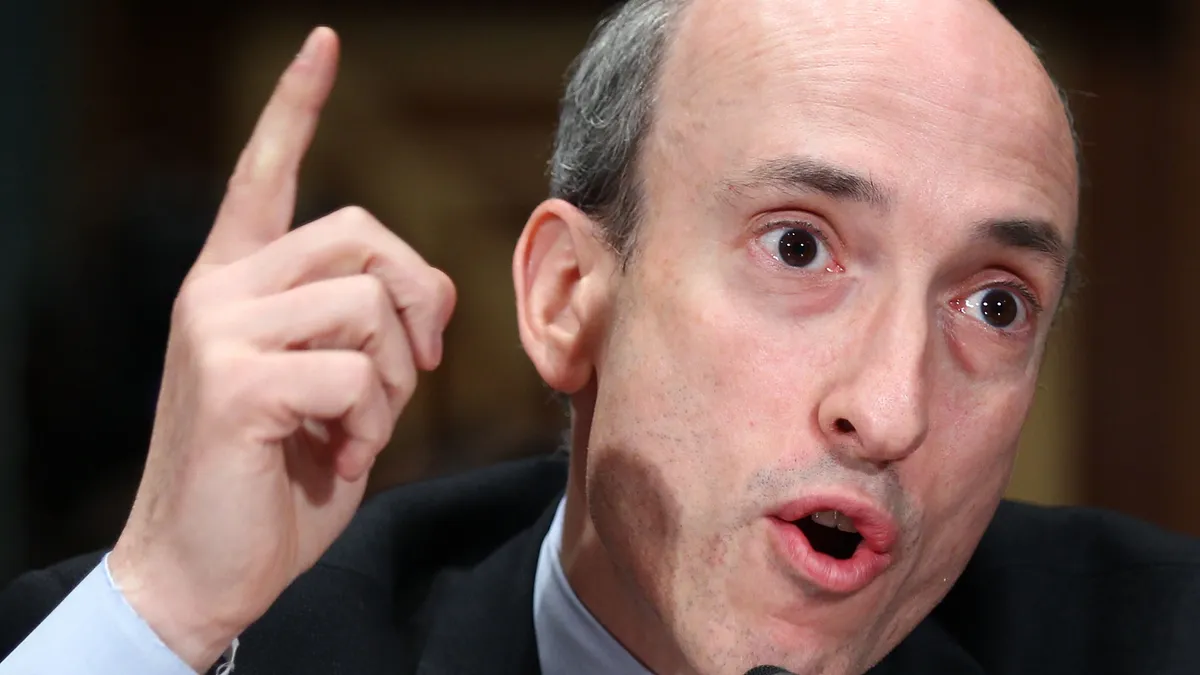Dive Brief:
- The Securities and Exchange Commission (SEC) proposed that companies follow detailed rules for reporting on climate risk, saying that businesses and investors will benefit from clear, uniform disclosures on the costs from climate change.
- The disclosure rules “would provide investors with consistent, comparable, and decision-useful information for making their investment decisions and would provide consistent and clear reporting obligations for issuers,” SEC Chair Gary Gensler said Monday before the commission voted 3-1 for the proposal. “Companies and investors alike would benefit from the clear rules of the road.”
- Under the proposal, the SEC would require companies to describe on Form 10-K their governance and strategy toward climate risk and their plan to achieve any targets they have set for curbing such risk. Companies would also need to disclose data on their greenhouse gas emissions, either from their facilities or through their energy purchases, and obtain independent attestation of their data.
Dive Insight:
The SEC proposal will probably come under fire from industry groups claiming that the agency seeks to impose an excessive burden on companies and is ranging beyond its expertise and congressional mandate, according to attorneys who specialize in environmental law. The rules are now subject to a two-month public comment period.
Organizations such as the Business Roundtable and U.S. Chamber of Commerce may challenge the SEC’s bedrock assertion that carbon emissions is a “material” fact that should be included on a company’s financial statements, according to David Brown at Alston & Bird.
Also, SEC “mission creep is absolutely a risk,” Brown said, spotlighting the requirement for third–party attestations of carbon emissions estimates and the mandate that some companies report on so-called Scope 3 emissions by their suppliers, vendors and other third parties across their supply chains. Such reports would be phased in, subject to safe harbor protections and not required of smaller companies.
“CFOs should absolutely have their radar up for the additional costs and burdens that it would take in order to comply with this,” Brown said in an interview.
Compliance with the disclosure rules would “take a lot of growing pains,” he said, requiring greater spending on more in-house expertise and other resources.
If enacted, the SEC proposal would speed the growth of a “climate industrial complex,” SEC Commissioner Hester Peirce said before voting against the disclosure requirements. “We are here laying the cornerstone of a new disclosure framework that will eventually rival our existing securities disclosure framework in magnitude and cost and probably outpace it in complexity.”
“The proposal takes us outside of our statutory jurisdiction and expertise, which harms the agency’s integrity,” she said. “In addition, filling SEC filings with information that is inherently unreliable undercuts the credibility of the rest of the information in these important filings."
U.S. lawmakers and industry groups have said rules for detailed carbon emissions disclosure could increase companies’ litigation risk and raise their cost of capital.
The 12 Republican senators on the Senate Banking Committee in a March 7 letter to Treasury Secretary Janet Yellen warned about “the potential damaging effects to national security from the unprecedented efforts of federal financial agencies to develop regulations that some intend to use for limiting U.S. energy producers’ access to credit and capital.
“Such actions would begin to curtail the supply of domestic energy, leading to higher costs for American households and making our country and allies more vulnerable to the consequences of Russian aggression,” according to the senators, including Pat Toomey, R-Pa., the committee’s ranking member.
Before enacting new climate-related regulation, the SEC should first consider U.S. energy security and “the threat to global energy supplies from Russia and similar repressive regimes,” the senators said.
The U.S. Chamber of Commerce said Monday the agency proposal will not help efforts by companies to provide investors with useful climate risk information.
The chamber “is concerned that the prescriptive approach taken by the SEC will limit companies’ ability to provide information that shareholders and stakeholders find meaningful while at the same time requiring that companies provide information in securities filings that are not material to investors,” according to Tom Quaadman, executive vice president for the chamber’s Center for Capital Markets Competitiveness.
“The Supreme Court has been clear that any required disclosures under securities laws must meet the test of materiality, and we will advocate against provisions of this proposal that deviate from that standard or are unnecessarily broad,” Quaadman said in a statement.
Environmental groups hailed the SEC proposal.
“Investors need to understand the size and scope of climate risk, and today’s proposal is a welcome step toward that goal,” according to Michael Panfil, director of climate risk strategies for the Environmental Defense Fund.
“Climate-related financial risks are already significant and growing every day,” he said. “In the last two years alone, the United States has suffered from more than 40 weather and climate disasters that each caused at least $1 billion in economic damages.”
Investors with $130 trillion in assets under management have pushed for climate risk disclosures, Gensler said before the SEC vote.












